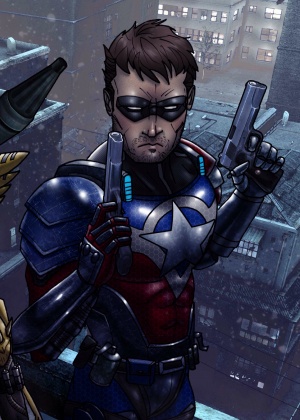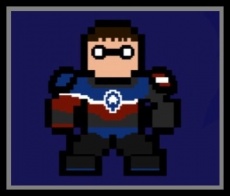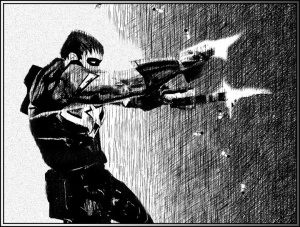Difference between revisions of "Citizen 13"
Citizen 13 (Talk | contribs) (→HISTORY) |
Citizen 13 (Talk | contribs) (→HISTORY) |
||
| Line 118: | Line 118: | ||
''Getting back to the question at hand, what do people expect me to do? Retire? I've no right to retire. I'd be giving up on everything my brothers and sisters in arms have done, and demeaning the sacrifices they made for this country. Hell, I'm made for this, and I wouldn't want it any other way. But everyone ain't like me, the average service-member lacks special abilities, and let's not forget that they have families to go home to. They ALL sacrifice, so we damn well better ensure that our country continues to be worth the sacrifice. Despite having gotten a little sloppy lately, we are still the greatest nation in the world, we are still the Alpha, and I'll be doing what I do until the end of my days to help make sure we stay that way."'' | ''Getting back to the question at hand, what do people expect me to do? Retire? I've no right to retire. I'd be giving up on everything my brothers and sisters in arms have done, and demeaning the sacrifices they made for this country. Hell, I'm made for this, and I wouldn't want it any other way. But everyone ain't like me, the average service-member lacks special abilities, and let's not forget that they have families to go home to. They ALL sacrifice, so we damn well better ensure that our country continues to be worth the sacrifice. Despite having gotten a little sloppy lately, we are still the greatest nation in the world, we are still the Alpha, and I'll be doing what I do until the end of my days to help make sure we stay that way."'' | ||
| + | |||
| + | |||
| + | </div> | ||
| + | </div> | ||
| + | </div> | ||
| + | </div> | ||
| + | |||
| + | <br> | ||
| + | |||
| + | ==<div style="color:#ffffff; background-color: #000000"><center>'''Early Life'''</center></div>== | ||
| + | |||
| + | <div style="padding:6px; border: 6px Solid #000000; color:#151B54; border-radius: 20px; border-radius:5px; background-color: #151B54"> | ||
| + | <div style="padding:6px; border: 4px Solid #151B54; color:#ffffff; border-radius: 20px; border-radius:5px; background-color: #151B54"> | ||
| + | <div style="font-size:12px;color:black"> | ||
| + | <div style="font-size:12px;color:#ffffff"> | ||
| + | |||
| + | James Rodgers was born on July 10th, 1922. His parents owned a farm out of Beaumont, Texas and he grew up as an only child. James had a deep respect for his father, who had served in WWI and was a decorated veteran. Growing up, his father taught him how to live off the land, how to fish, to hunt, and most importantly, to shoot. James' father was a hero in his eyes, and this would later factor in on James' decision to enlist in the U.S. Army. | ||
| + | |||
| + | In 1938, James' father passed away. After his father passed, James' mother sold the farm despite his protests to keep it, and they moved to live closer to relatives in Dallas. James never truly forgave his mother for this. In 1940, at the age of 18, James enlisted into the U.S. Army to become an Airborne Ranger. It is unknown if he ever spoke to his mother again. | ||
| + | |||
| + | After the United States entered WWII, James conducted his tour of duty in Europe. He saw a great deal of combat over the course of his tour, and received a battlefield promotion to Sergeant after displaying a level head and a solid ability to lead men into combat. Despite having participated in numerous heroic and brutal assaults against the Germans throughout the war, James had came out from most of these engagements with only a few minor injuries. But as the end of the war drew near, James' luck seemed to run short. | ||
| + | |||
| + | According to reports written by James' superior officers, plus testimonies given by fellow brothers-in-arms, James' final combat actions in WWII were credited as valorous beyond measure and the finest example of the determination needed to win the war. The engagement had been a minor one, so not many details of said engagement were recorded and preserved. From what reports are available, we gathered that James' company had encountered a German force that pushing back against advancing U.S. troops, causing James' company to halt in their movement and dig into defensive positions. I'd like to include in my report that despite how the engagement was won, it had been a sound decision to dig in defensively on part of the company commander due to the fact that the enemy force's numbers were unknown at the time. The Germans dropped artillery on them while simultaneously charging their defenses, but the U.S. soldiers held their ground. During one such rush of Nazi troops, a German grenade found it's way into the foxhole that James had been sharing with five other members of his platoon. James was first to react, grabbing the grenade to throw it back to the Germans. As he pitched it over the lip of his foxhole, the grenade detonated and took James' left arm with it. Despite the loss of his arm James continued to fight. The loss of his arm seemed to send him into a rage, instead of incapacitating him from further combat and going into shock. Likely experiencing "Doc Holiday" syndrome, he drew his Colt 1911 .45 ACP and sprung from his foxhole, rushing the Germans. James sprinted towards the closest Nazi he laid eyes on and waited to fire until he was within range of his sidearm. They say he only paused in his charge to reload. Holstering his 1911 to free his remaining hand, he would produce a fresh magazine and insert it into the mag well, then drew and continuing his assault. Others quickly mimicked his furious charge, and soon enough the entire company had begun a suicidal assault on the Germans. James had continued his assault for several minutes before passing out from blood loss and pulled from the front lines. | ||
| + | |||
| + | As it turned out, the German force was much smaller than anticipated. They had taken a big gamble at being overly aggressive to seem as if they were a larger force with many in reserve. Some called the company extremely lucky, as their victory in this engagement likes could have been a massive failure instead, but many from the unit cockily proclaimed that luck had nothing to do with it. | ||
| + | |||
| + | Medically evacuated out of Germany, James was sent to Walter Reed Army Medical Center for rehabilitation. This was where he first met Commander Grey and was recruited for "Project Citizen". | ||
| + | |||
| + | Over the course of his service in the United States Army, James had been awarded three Purple Hearts, one Bronze Star(with Valor), and the Distinguished Service Cross. He earned a Combat Device for his Parachutist Badge, and the Combat Infantry Badge as well. His recorded rank by the end of his time in service in 1945 was Sergeant/E-5. | ||
Revision as of 16:06, 10 October 2014
|
The author of this article has marked this as a creative work, and would prefer that other users not edit it. Please respect this, and unless repairing a typo, spelling, or other minor technical error, think of this page as read-only. |

| "Luck has nothing to do with it."
| ||||||||||||||||||||||||||
| Player: @maxymus | ||||||||||||||||||||||||||

| ||||||||||||||||||||||||||
| Character Build | ||||||||||||||||||||||||||
| Class Focus: | DPS | |||||||||||||||||||||||||
| Power Level: | 40 | |||||||||||||||||||||||||
| Research & Development: | Arms (Ordnance) | |||||||||||||||||||||||||
| Biographical Data | ||||||||||||||||||||||||||
| Real Name: | James Rodgers | |||||||||||||||||||||||||
| Known Aliases: | Citizen Thirteen, Thirteen, Captain Kickass(by Little Devil), Lone Star(for a short time) | |||||||||||||||||||||||||
| Gender: | Male | |||||||||||||||||||||||||
| Species: | Human / Super Human | |||||||||||||||||||||||||
| Ethnicity: | Caucasian | |||||||||||||||||||||||||
| Place of Birth: | Beaumont, Texas | |||||||||||||||||||||||||
| Base of Operations: | Millenium City | |||||||||||||||||||||||||
| Relatives: | None | |||||||||||||||||||||||||
| Characteristics | ||||||||||||||||||||||||||
| Age: | 40 years estimated of unfrozen activity (92 in actual time) | |||||||||||||||||||||||||
| Height: | 6' 1" | |||||||||||||||||||||||||
| Weight: | 270 lbs | |||||||||||||||||||||||||
| Eyes: | Blue | |||||||||||||||||||||||||
| Hair: | Brown | |||||||||||||||||||||||||
| Complexion: | Rough | |||||||||||||||||||||||||
| Physical Build: | Muscular, Athletic | |||||||||||||||||||||||||
| Physical Features: | Bionic left arm, patriotic body armor | |||||||||||||||||||||||||
| Status | ||||||||||||||||||||||||||
| Alignment: |
Chaotic Good | |||||||||||||||||||||||||
| Reputation: |
Memorable | |||||||||||||||||||||||||
| Identity: | Not secret | |||||||||||||||||||||||||
| Years Active: | Off and on between 1945 and 1977, and from 1999 to present day | |||||||||||||||||||||||||
| Citizenship: | United States Citizen | |||||||||||||||||||||||||
| Occupation: | Patriotic Icon, Super-Soldier | |||||||||||||||||||||||||
| Education: | High School education, Military training, specialized education in various languages and cultures. | |||||||||||||||||||||||||
| Marital Status: | Dating Francesca Peretti | |||||||||||||||||||||||||
| Known Powers and Abilities | ||||||||||||||||||||||||||
| Superhuman reflexes and endurance. Olympic level strength. Patriotic fervor. Expert marksman and gunslinger. | ||||||||||||||||||||||||||
| Equipment and Paraphernalia | ||||||||||||||||||||||||||
| Custom patriotic themed body armor(standard suit is made mostly of Regor plastics, Kevlar, and some Kendrium), repulsor jump boots, personal teleporter. Common weapons include dual Colt 1911 XSE .45's, Bushmaster ACR, assorted grenades. A Bionic arm built from Kendrium, equipped with a variety of useful utilities, such as a taser, lock pick, EMP, adrenaline/bio foam injector, and deployable energy shield that is able of stopping most kinetic projectiles. | ||||||||||||||||||||||||||
| Attributes | ||||||||||||||||||||||||||
| Strength |
|
Endurance |
|
|||||||||||||||||||||||
|---|---|---|---|---|---|---|---|---|---|---|---|---|---|---|---|---|---|---|---|---|---|---|---|---|---|---|
| Agility |
|
Speed |
|
|||||||||||||||||||||||
| Fighting |
|
Projectiles |
|
|||||||||||||||||||||||
| Durability |
|
Resistance |
|
|||||||||||||||||||||||
| Intelligence |
|
Psyche |
|
|||||||||||||||||||||||
| Intuition |
|
Charisma |
|
|||||||||||||||||||||||
| ReldinBox Template | ||||||||||||||||||||||||||
If there was only one word to describe Citizen Thirteen, then it would be the most bad ass, American word ever, and they'd have to put it in the New Oxford American Dictionary with a picture of Citizen Thirteen beside it. Citizen Thirteen is a patriot and a warrior, a defender of freedom and protector of the American people. He is an expert in small arms and hand to hand combat. He is most notable for his patriotic attire, his dual Colt 1911's, and bionic arm. A product of the post-World War I era, the Great Depression, and World War II. In 1940, James Rodgers enlisted to serve the US Army as an Airborne Ranger in the European campaign. Towards the end of the war, he lost his left arm in combat and was transported to Walter Reed Hospital in Washington, DC. This was where he was recruited for Project Citizen, a program designed to put disabled veterans, who still had a strong desire to serve, back into action as "super-soldiers".
From 1945 to 1977, James Rodgers was known as "Citizen Thirteen", as he was the thirteenth operative added onto Project Citizen's roster. The Citizen's were one of America's most elite Black Op groups of that era, specializing in recon, search and rescue, training friendly forces, espionage, sabotage, and "capture or kill" missions. Often their missions were conducted in the "gray area" of morality. This didn't always sit well with James, but they were Soldiers, and following orders was part of their duty.
By 1977 the roster for Project Citizen had diminished greatly, and the commander of the project was revealed to be a double agent, working for a special section of the KGB. Thirteen was forced into cryogenic storage and intentionally mislabeled and lost. He stayed this way for twenty three years.
Sometime in 1999, completely by chance, Kenshin DeLeon(a ronin warrior) recovered the cryogenic chamber and released it's inhabitant. Once again James had a choice; he could live out his life as a regular civilian, or continue to follow his heart and serve. With the age of super-heroes in full swing, Kenshin was able to convince James to use his old name and military training and become something more than just a soldier. Donning a domino mask and body armor colored to represent his patriot spirit, James Rodgers began to redefine what "Citizen Thirteen" stood for. A defender of the American dream. A citizen, standing up for what is right, for the betterment of the United States.
Citizen Thirteen loves his country, he loves his guns, and he loves to have a good time at the local VFW when the old timers get together to have a few beers.
Contents
HISTORY
Before I begin on the history of James Rodgers, aka Citizen Thirteen, I want to share a statement he once gave during an interview. The statement was in response to the question "Why do you do it, why do you still continue to serve our country after so many years of doing so?" I believe this statement alone reveals more about who Citizen Thirteen is than anything else that will be included in my report.
"When I first joined the Army, I did so because I wanted to be like my Pa. Serving came with a sense of pride, pride in myself and in what my father had done before me. I felt like I understood my father more, and I felt like I was doing something truly good, something worth doing.
After the war ended in 1945, I still had that pride, but there was something else that motivated me to join Project Citizen. It felt like an obligation, or a calling, a duty, whatever. Like if I didn't do it I would be letting someone down. We had just won the war, we were the heroes of the world! We had a responsibility now, to be examples to others to stand up against any evil out there that tried to bully the little guy. I truly believed that. I still do, but it's obviously not so black and white these days.
So I agreed to join Project Citizen and become something more. For the times, our combat effectiveness was unmatched. It was a great feeling to not only be able to fight the threats of the world more effectively, but to feel like our efforts were saving the lives of other troops on the front lines. Course I didn't know that Project Citizen had such a dark side. How they willingly accepting such a high casualty rate just to get a handful of us through the initiation process... Can't say what was produced was worth risking a man's life. So when we, I mean, those of us that had become 'Citizens' found out about that, it really pushed us to go above and beyond what we'd accomplished in prior missions. Our motivations to fight had changed at that little revelation. We weren't just fighting for our country or to assist our Armed Forces, but we had to justify those lost to the damned initiation process. We felt... tarnished, I guess. And of course how we were utilized in Vietnam didn't help any.
And yet here I am, decades later, still 'fighting the good fight'. I suppose it's hard to see why I'm still willing to serve after so many bad decisions on our government's part. This country has really given itself a rough image since Vietnam. The American People are more cynical than ever, less trusting of the government than ever. And ya know what? They should be. There's nothing wrong with questioning your government and holding them accountable for their actions. In fact, that's how America is suppose to be. We just got lazy somewhere along the way, and let things get out of hand.
Getting back to the question at hand, what do people expect me to do? Retire? I've no right to retire. I'd be giving up on everything my brothers and sisters in arms have done, and demeaning the sacrifices they made for this country. Hell, I'm made for this, and I wouldn't want it any other way. But everyone ain't like me, the average service-member lacks special abilities, and let's not forget that they have families to go home to. They ALL sacrifice, so we damn well better ensure that our country continues to be worth the sacrifice. Despite having gotten a little sloppy lately, we are still the greatest nation in the world, we are still the Alpha, and I'll be doing what I do until the end of my days to help make sure we stay that way."
Early Life
James Rodgers was born on July 10th, 1922. His parents owned a farm out of Beaumont, Texas and he grew up as an only child. James had a deep respect for his father, who had served in WWI and was a decorated veteran. Growing up, his father taught him how to live off the land, how to fish, to hunt, and most importantly, to shoot. James' father was a hero in his eyes, and this would later factor in on James' decision to enlist in the U.S. Army.
In 1938, James' father passed away. After his father passed, James' mother sold the farm despite his protests to keep it, and they moved to live closer to relatives in Dallas. James never truly forgave his mother for this. In 1940, at the age of 18, James enlisted into the U.S. Army to become an Airborne Ranger. It is unknown if he ever spoke to his mother again.
After the United States entered WWII, James conducted his tour of duty in Europe. He saw a great deal of combat over the course of his tour, and received a battlefield promotion to Sergeant after displaying a level head and a solid ability to lead men into combat. Despite having participated in numerous heroic and brutal assaults against the Germans throughout the war, James had came out from most of these engagements with only a few minor injuries. But as the end of the war drew near, James' luck seemed to run short.
According to reports written by James' superior officers, plus testimonies given by fellow brothers-in-arms, James' final combat actions in WWII were credited as valorous beyond measure and the finest example of the determination needed to win the war. The engagement had been a minor one, so not many details of said engagement were recorded and preserved. From what reports are available, we gathered that James' company had encountered a German force that pushing back against advancing U.S. troops, causing James' company to halt in their movement and dig into defensive positions. I'd like to include in my report that despite how the engagement was won, it had been a sound decision to dig in defensively on part of the company commander due to the fact that the enemy force's numbers were unknown at the time. The Germans dropped artillery on them while simultaneously charging their defenses, but the U.S. soldiers held their ground. During one such rush of Nazi troops, a German grenade found it's way into the foxhole that James had been sharing with five other members of his platoon. James was first to react, grabbing the grenade to throw it back to the Germans. As he pitched it over the lip of his foxhole, the grenade detonated and took James' left arm with it. Despite the loss of his arm James continued to fight. The loss of his arm seemed to send him into a rage, instead of incapacitating him from further combat and going into shock. Likely experiencing "Doc Holiday" syndrome, he drew his Colt 1911 .45 ACP and sprung from his foxhole, rushing the Germans. James sprinted towards the closest Nazi he laid eyes on and waited to fire until he was within range of his sidearm. They say he only paused in his charge to reload. Holstering his 1911 to free his remaining hand, he would produce a fresh magazine and insert it into the mag well, then drew and continuing his assault. Others quickly mimicked his furious charge, and soon enough the entire company had begun a suicidal assault on the Germans. James had continued his assault for several minutes before passing out from blood loss and pulled from the front lines.
As it turned out, the German force was much smaller than anticipated. They had taken a big gamble at being overly aggressive to seem as if they were a larger force with many in reserve. Some called the company extremely lucky, as their victory in this engagement likes could have been a massive failure instead, but many from the unit cockily proclaimed that luck had nothing to do with it.
Medically evacuated out of Germany, James was sent to Walter Reed Army Medical Center for rehabilitation. This was where he first met Commander Grey and was recruited for "Project Citizen".
Over the course of his service in the United States Army, James had been awarded three Purple Hearts, one Bronze Star(with Valor), and the Distinguished Service Cross. He earned a Combat Device for his Parachutist Badge, and the Combat Infantry Badge as well. His recorded rank by the end of his time in service in 1945 was Sergeant/E-5.
POWERS AND EQUIPMENT
Enhanced Attributes
Skills and Abilities
Firearms and Accessories
Costumes / Body Armor
AFFILIATES
GALLERY
Let's be honest, Dirty Harry would have been WAY cooler if he had used one of these. The Anaconda and Python both have amazing reputations, it's a wonder Colt stopped manufacturing these over ten years ago. James has been seen carrying this handgun on occasion, but revolvers in general aren't a practical EDC option for his line of work. Situational use only.
James likes to carry this one when deploying with Marines. He does this because he likes to show off just how great a gun the Shrike is, and what exactly the Marines are missing out on for choosing an HK416 as the new weapon for their SAW program. Idiots! You replaced an LMG with an assault rifle when you specifically asked for a new LMG to fill the role of the M249! Bah!!!!













